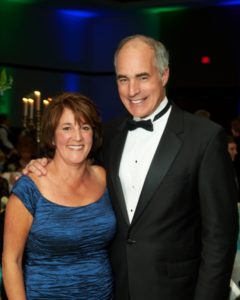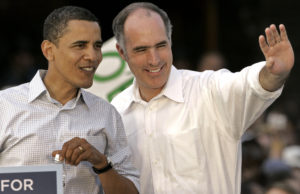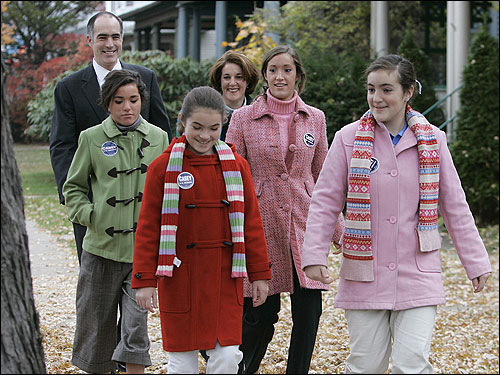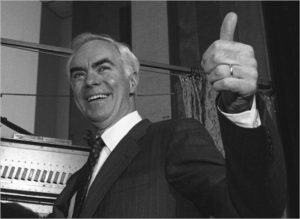Montgomery County Leadership: Senator Bob Casey

On the final morning of the Democratic National Convention happening in neighboring Philadelphia, Senator Robert P. Casey, Jr. speaks with MONTCO Today about growing up in Scranton, the love his parents had for each other and for he and his seven siblings, playing power forward on his high school basketball team, losing to Ed Rendell in the 2002 Democratic Gubernatorial Primary then bouncing back five years later to win a Senate seat, endorsing Barack Obama in 2008, his take on how history will view Obama’s time in office and his ongoing Senate focus on early childhood education initiatives.
Where did you grow up Senator?
I was born and grew up in Scranton the middle child and oldest son of eight children. I lived my entire life in Scranton. In fact, the only time I lived away from Scranton was when I went to college and law school.
What memories do you have of growing up in Scranton at that time?
I was blessed in that I had the security you would hope every child had. First and foremost, I had two parents who loved each other, and I knew they loved each other. Second, my father was a lawyer, and although he didn’t make a lot of money practicing law, at least not until later in life, he did make enough to keep us in an upper-middle-class bracket.
When you mentioned feeling secure Senator, you led with love?

Yeah, I was really lucky to know my parents loved each other and me, but it didn’t strike me how lucky I was until I was in college. One day in college I was sitting in a theology class where the professor was talking about the relationship between a mother and father. During his lecture he said, the most important thing a father can do for his children is to show them that he loves their mother.
The statement at the time seemed so simple and fundamental, but it had a big impact on me. It was the first time I had ever thought about the relationship my parents had. Even though my father traveled and was on the road a lot, he showed my mother in big and little ways he loved her. Their relationship gave my entire family a security blanket.
Where did you go to high school?
I went to Scranton Preparatory School, which was a Jesuit high school whose mission was to make sure kids like me went to college.
Did you play any sports in high school?
I played basketball for all four years; my first year on the Freshman team, my Sophomore year on the junior varsity team and my Junior and Senior year on the varsity team. In fact, when I was that age, all I thought about was basketball.
Were you any good at basketball or was it just your passion for the game that drove you?
I was what they would have called in those days a power forward with not nearly as much power as power forwards have today. I worked hard at my game. I wasn’t fast or quick, but I played pretty good defense and knew how to box out. My teammates voted me and Ward Fitzpatrick, a good friend of mine, co-captains of the team. Ward and I ended up going to Holy Cross together, he on a basketball scholarship where I did the most traditional way!
Did you play basketball at Holy Cross?
I tried out one year but didn’t make the one open spot on the team. I ended playing intramural basketball which was really competitive.
Ward may have made the Holy Cross team, but you played basketball with President Obama several times during the 2008 campaign?
That’s true! It’s the only basketball advantage I ever had over Ward! When I played with then-candidate Obama, Obama would pick the teams. I was never his first pick. He was looking for talent! Rather, the first guy Obama always picked was Reggie Love. Reggie played basketball for Duke and traveled everywhere with him. The president knew what he was doing.
What kind of music were you listening to in high school and college, Senator?
I pretty much listened to the basic top 40 in high school. Ultimately I became and still am, a huge Bruce Springsteen fan. Springsteen first came on the scene in 1975 if I have my years right. I was immediately focused on his music and became a real fan of his in college.
What was there about Holy Cross that drew you in?

My father had gone there, and I was following his educational path. When I first got there, I wasn’t convinced it was the right place for me. Even though I ended up appreciating Holy Cross’ academics, the best thing that happened to me at Holy Cross for me was I met my wife Terese there.
You graduate from Holy Cross and then law school at The Catholic University of America in 1988, you could have done anything. Why did you choose politics as a career path?
My father did a nice job exposing us to politics and government without over exposing us. Sometimes when you grow up in a political family, the kids go to every event and rally. That wasn’t true for our family. My father was worried if he did that we wouldn’t lead a natural or balanced life. His example and service inspired me. He lost more elections for governor before he finally won than anyone running for governor before him. He lost three primaries for Governor before he finally won in 1986. Even with all those losses he never became bitter or jaded by the loss.
You’ve had your share of losses along the way as well Senator?
Not as many as some. I think about the personal losses Vice President Biden has had to endure and I don’t come close to that in a personal sense. On the political side, I had one big loss that taught me a lot of lessons.
Are you talking about the Democratic Primary for Governor in 2002?
Yes. I was up against then-mayor of Philadelphia Ed Rendell. The irony was that Ed and I had been friends for years before the race and became even better friends after the race. Ed ran in 1986 against my father, which was my father’s fourth primary. My father won the primary and went on to become governor and Ed went on to become Mayor of Philadelphia. Eight years later, Ed and I end up battling for the Democratic gubernatorial nomination. Ed won that rematch of sorts in effect winning the Casey vs. Rendell rubber match.
You won a seat in the Senate in 2007 and became an early supporter of Barack Obama in 2008. Looking back, any regrets over that endorsement?

No. I knew Obama well enough at the time to know he was the type of candidate who could bring the country together to work on big problems. I knew the kind of person he was, that he was a good husband and father and an honorable person.
The last eight years has only amplified how I felt in 2008 when I endorsed him. If anything I’ve grown to respect him even more. Last week, Timothy Egan of the New York Times wrote a good article about Obama, the person, husband, father, public official, that captured, apart from policy and politics, the man who Obama really is.
What do you think will be Obama’s legacy?
Based upon these easy numbers – 14+ plus million jobs created since the end of the recession, 20 million people have health care that didn’t have it before, and the deficit is down by one trillion dollars, it’s remarkable what President Obama has been able to put on the table.
To be fair, there was a lot more he wanted to get done and more that I hoped he would have gotten done. But when you compare his eight years in office to historical precedence, I think his eight years will stand up pretty well.
Looking into the future Senator Casey, what are your greatest challenges and opportunities?

One of my greatest blessings I have is my family; both the family I grew up in and the one Teresa and I have. Terese and I have been blessed with four wonderful daughters. I give Terese 99.9 percent of the credit for how our daughters have turned out. Elyse, who is 27 years old, is out of college and beginning a career in social work, Caroline is working in Philadelphia, Julia is heading into a volunteer program and Marena, who is 19, starts her Sophomore year at Fordham next month.
What will be your major focus through the end of 2016?
If there’s one major issue I haven’t been able to get over the goal line, it would be substantial legislation that finally makes a more national commitment to early childhood education and learning. All the studies show that linkage between learning and earning meaning the more a child learns, the more he or she will earn when they become an adult.
If more of our kids have a chance to read and learn at an early age, no matter their income, their whole lives will change.
I had an amendment that would have brought early learning opportunity to 3 million additional children brought to a vote last year. All the Democrats voted for the amendment’s passage but all my Republican colleagues voted against it. I want to keep pushing that big rock up the hill.
Perhaps my most significant achievement regarding direct impact on people’s lives has been the ABLE Act. The ABLE Act was a piece of legislation I worked on with Senator Richard Burr of North Carolina and which passed in the final hours of the 2014 legislative session. The Act created a savings vehicle for people to save for disabilities similar to ones we have for education. Families with a child on the Autism spectrum or with Down Syndrome can save over time for the care of that child and not be penalized as was the case before the legislation passed.

What is the best piece of advice you ever received?
It would be the example my father set as well as talked to us about the importance of conducting our personal and public lives with integrity. That lesson, which he transmitted to myself and all my brothers and sisters over time, had real meaning. I also learned over the years that I had to earn people’s trust every day. It sets a high standard, but I’m better off if I try to achieve it every day.
Stay Connected, Stay Informed
Subscribe for great stories in your community!
"*" indicates required fields
























![ForAll_Digital-Ad_Dan_1940x300[59]](https://montco.today/wp-content/uploads/sites/2/2022/06/ForAll_Digital-Ad_Dan_1940x30059.jpg)
![95000-1023_ACJ_BannerAd[1]](https://montco.today/wp-content/uploads/sites/2/2023/03/95000-1023_ACJ_BannerAd1.jpg)
















